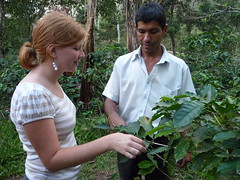 The coffee industry has had a major impact on the lives of most of Central America´s rural communities. In many cases, it has further impoverished families, creating land tenure problems and trapping small growers in a cycle of low selling prices and high production costs. However, some small coffee growers have found that by forming cooperatives, they are able to earn fairer wages for the coffee they produce.
The coffee industry has had a major impact on the lives of most of Central America´s rural communities. In many cases, it has further impoverished families, creating land tenure problems and trapping small growers in a cycle of low selling prices and high production costs. However, some small coffee growers have found that by forming cooperatives, they are able to earn fairer wages for the coffee they produce.
CECOCAFEN is one of these cooperatives, representing 2,637 small coffee growers. Santiago Dolmus, one of CECOCAFEN´s agronomists, referred to the cooperative as a “democratic” business that is tightly linked to the individual producers. Apparently, marketing and finding a fair price for coffee are the biggest struggles for coffee growers. As a large cooperative, CECOCAFEN can find markets for the coffee that Hill bring fairer wages to the farmers.
Dolmus gave four reasons for the existence of the cooperative: to sell coffee, to provide financing to farmers, to provide technical training to farmers, and to provide special programs for the cooperative´s members. In addition to finding fairer prices for its members, CECOCAFEN runs a women´s microfinancing program, a program to develop a market for high-quality coffee in Nicaragua, a tourism program in rural communities, and a youth education program.
On April 1, we visited Martin Vicente Padilla´s farm near Matagalpa, Nicaragua. Padilla is a member of the CECOCAFEN coffee cooperative and serves on the board of directors. His own coffee finca consists of about 9 acres of land that he tends using only organic farming methods. While organic coffee is his main source of income, he also grows a wide variety of fruits, precious woods, medicinal plants, and staple crops such as corn and beans. He raises chickens for eggs and meat, pigs for meat and extra income, and a cow to provide milk for his family.
While every member of the family works on the finca, they all take education very seriously. Through CECOCAFEN´s youth education program they were able to complete high school. Padilla is determined that all of his children will become professionals in some field of study, and two of them are well on their way, one studying to be a lawyer and another currently studying medicine in Venezuela.
Visiting the Padilla family´s finca reminded me again of how little I know about the origins of common products, in this case, coffee. Our visit also made me rethink my attitude toward coffee drinking. I don´t drink coffee, so I had always thought of it as a waste of resources, kind of like candy that doesn´t exactly hurt one´s body, but doesn´t really do any good, either. I never realized how many hundreds of thousands of people depend on the coffee industry to provide their daily rice and beans. Our visit also drove home the importance of buying fairly traded products. Before this trip, I viewed fair-trade products as things that were great to buy, as long as they were convinient to find and not too expensive. Now I realize that there´s a reason that most commercial coffee is cheaper: the small growers are paying the difference through low wages.
– Christina Harman